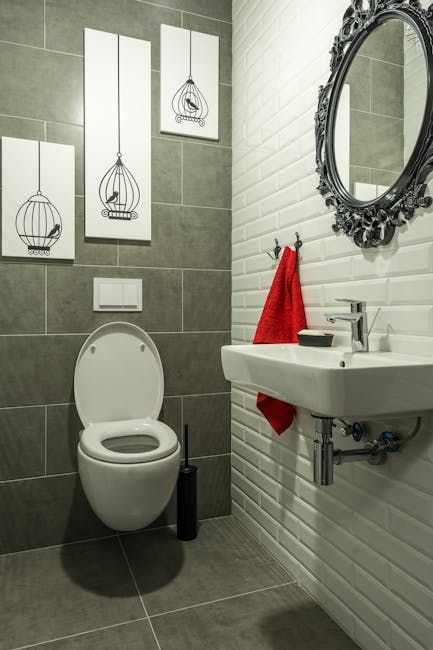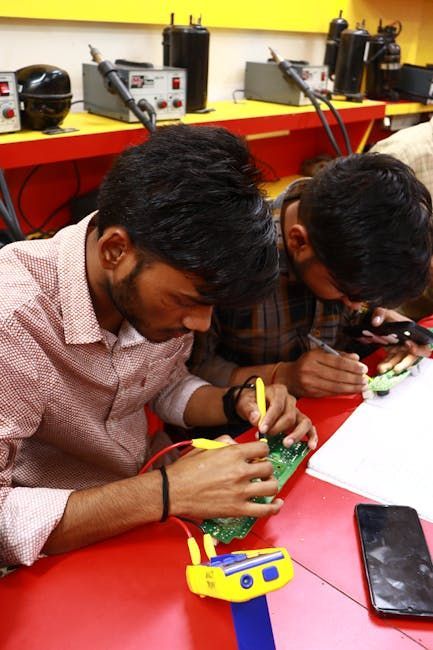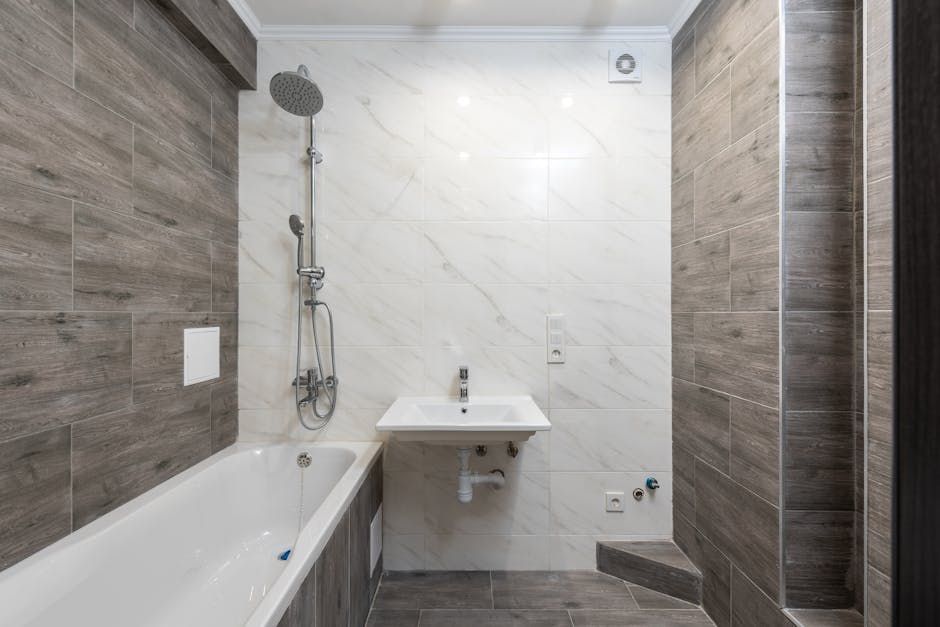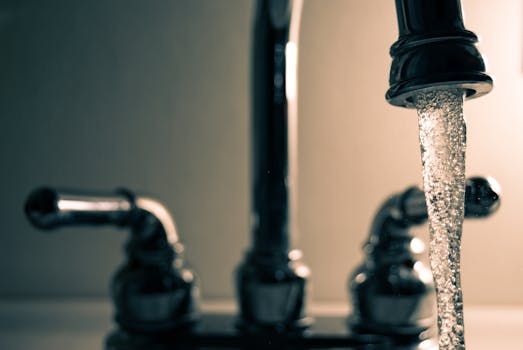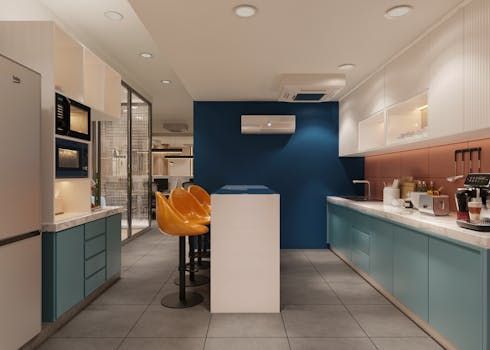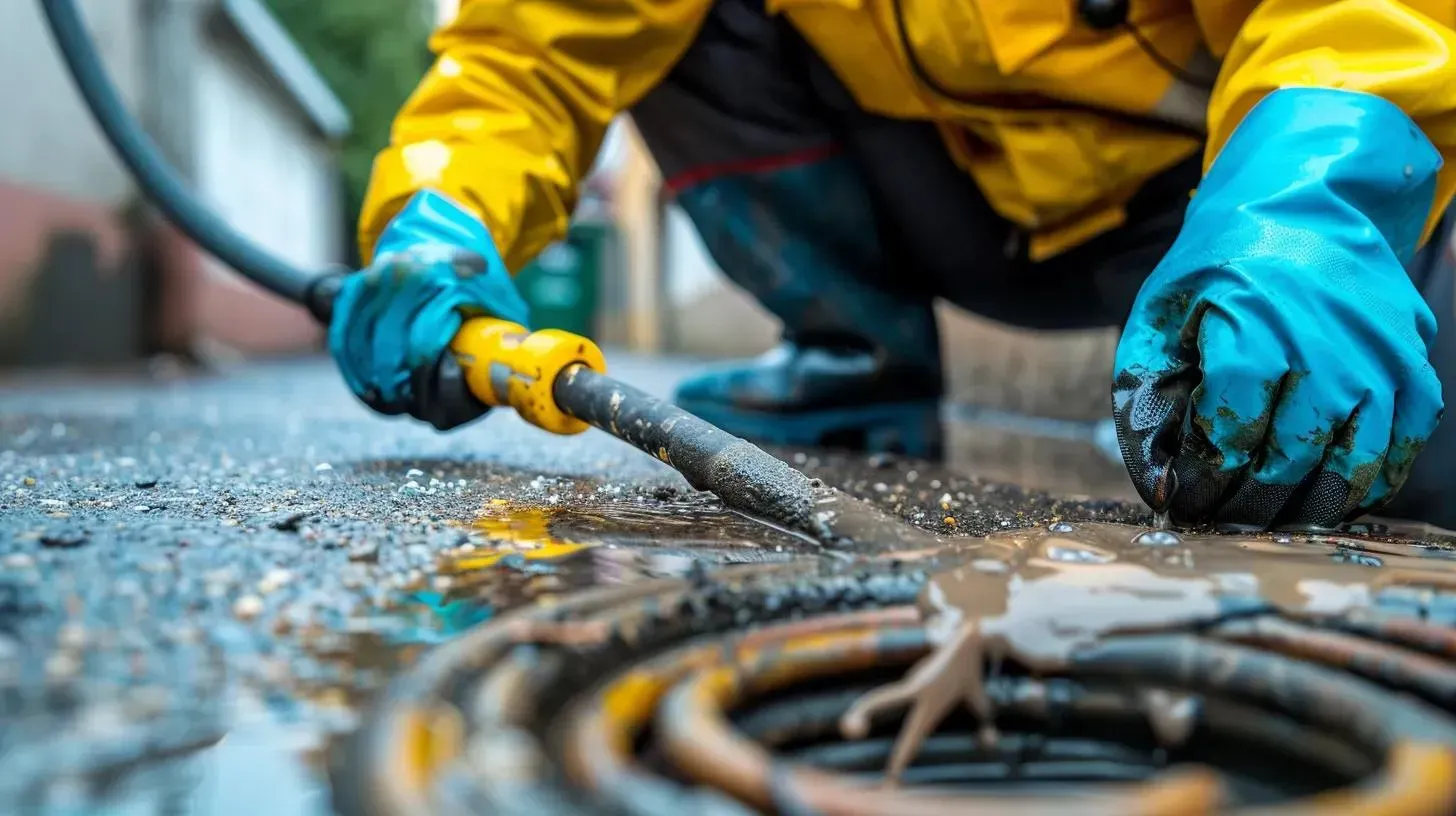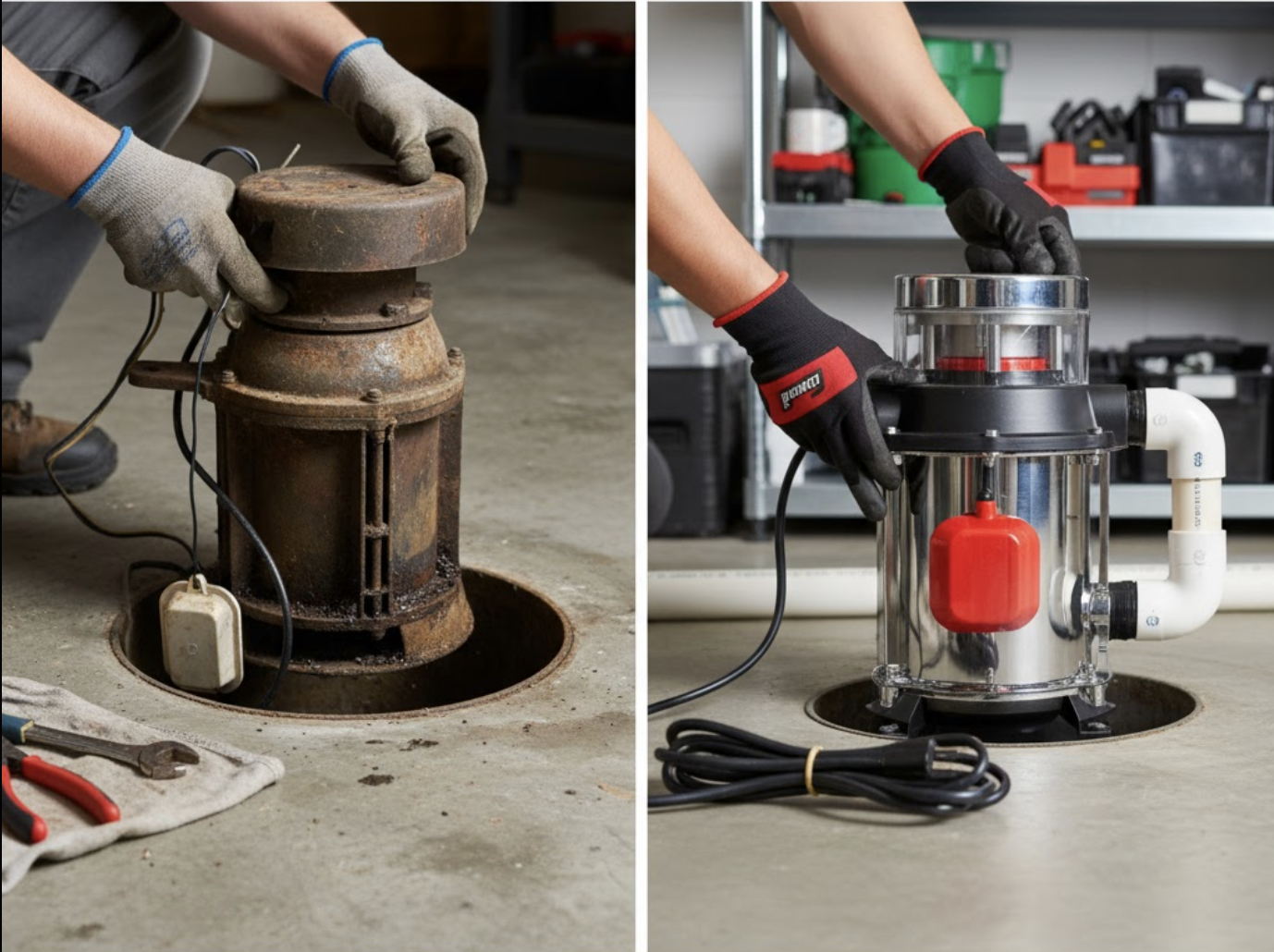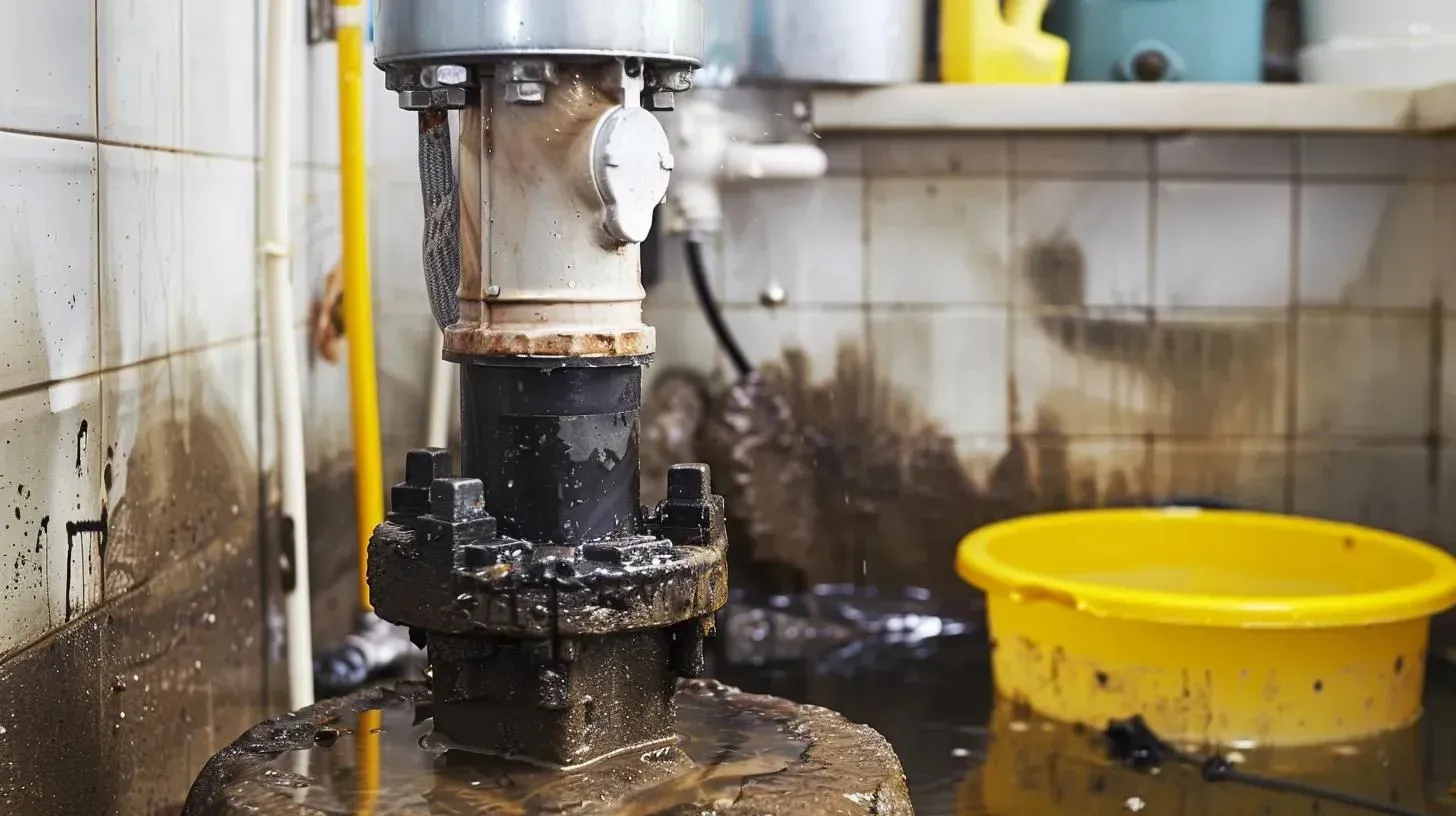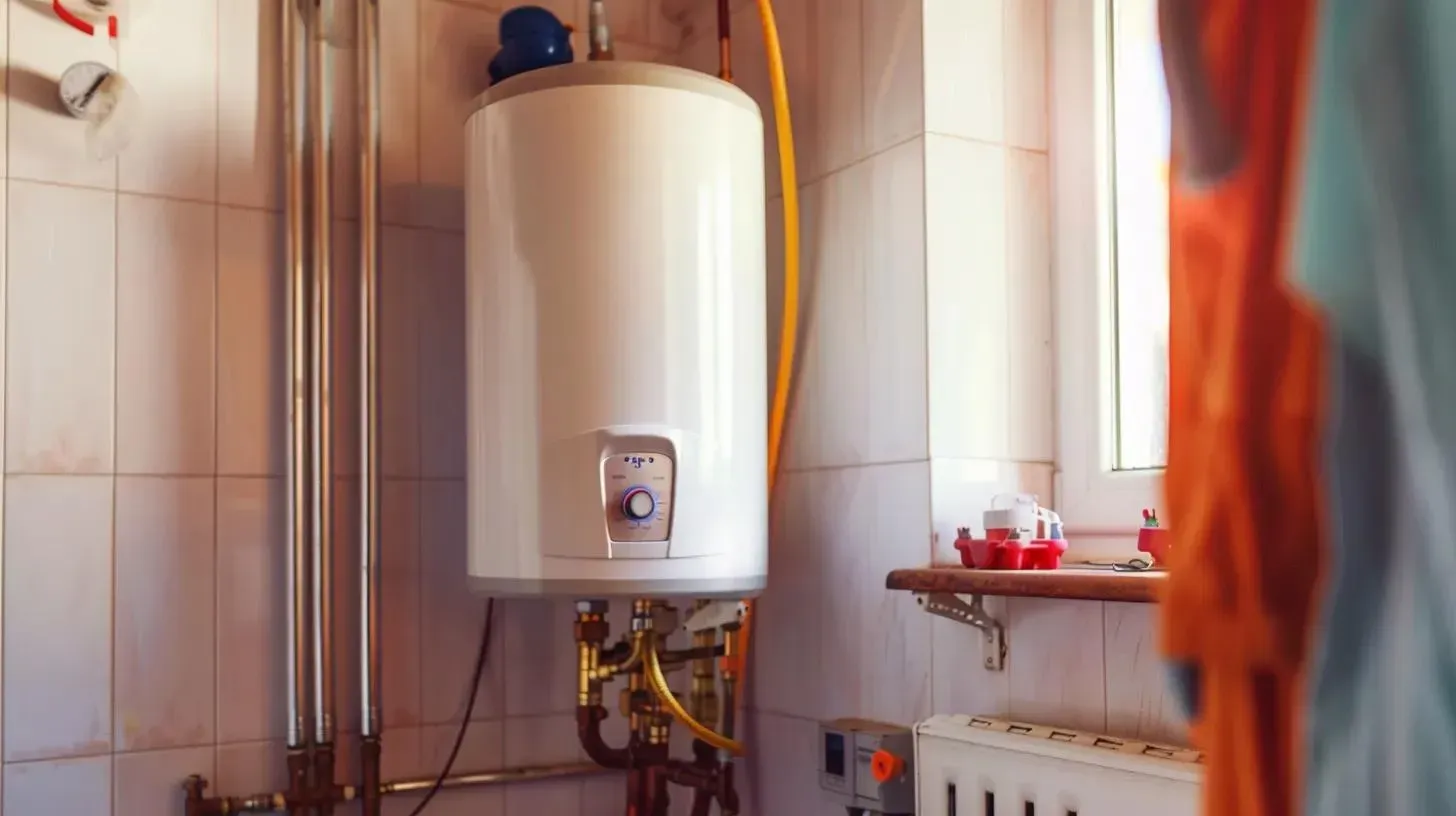Pipe Up Your Knowledge with These Handy Plumbing Tips
Master Your Home's Plumbing with These Essential Tips
Plumbing tips are crucial for every homeowner to prevent costly repairs and water waste. Here are the most important plumbing tips to remember:
- Locate your main water shut-off valve - Know where it is before an emergency
- Never pour grease down drains - Dispose in containers instead
- Use strainers in all drains - Prevent hair and food debris clogs
- Check for leaks regularly - Small drips waste up to 8 gallons daily
- Flush water heater annually - Removes sediment and improves efficiency
- Test toilets with food coloring - Reveals hidden leaks wasting up to 200 gallons daily
- Avoid chemical drain cleaners - Use baking soda and vinegar instead
Maintaining your home's plumbing system might seem intimidating, but with the right knowledge, you can prevent many common issues before they become expensive emergencies. From clogged drains to burst pipes, understanding basic plumbing maintenance can save you thousands in repair costs and help avoid the frustration of unexpected water disasters.
My name is Mike Martinez, owner of Accountable Home Plumbing in Denver, and I've spent years helping homeowners implement effective plumbing tips that prevent emergencies and extend the life of their systems. After responding to countless avoidable plumbing disasters, I've compiled these essential maintenance strategies to help you protect your home and your wallet.
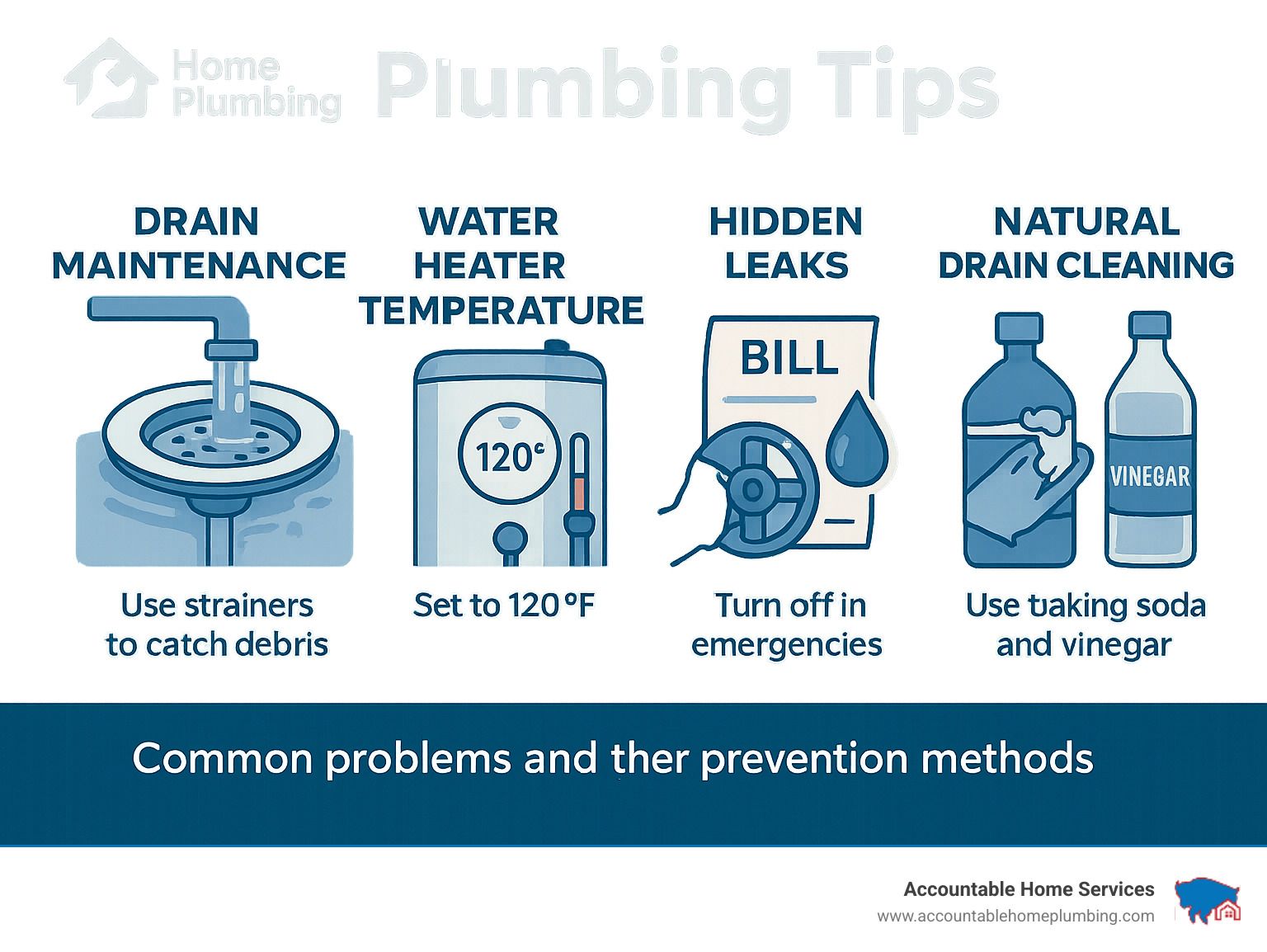
Plumbing Tips to Prevent Clogs at the Source
Let's face it—nobody wants to deal with a clogged drain emergency at 11 PM on a Sunday. After years of unclogging countless pipes across Denver, I've seen how a few simple habits can save you from that particular headache. The best part? Most of these plumbing tips take just seconds of your day.
Proper Grease Disposal
That bacon grease might seem harmless when it's hot and liquid, but once it cools in your pipes? It's like concrete. Trust me, I've chiseled enough of it out of Denver drains to know.
"Last month, I visited a home in Arvada where the kitchen sink hadn't drained properly in weeks," I tell customers. "When we opened the pipes, we found a solid grease blockage that had been building up for years. What could have been prevented with a simple mason jar ended up costing them nearly $400."
Instead of rinsing grease down the drain, let it cool in the pan, then scrape it into a container. Once full, toss it in the trash. For pans with residual grease, wipe them down with paper towels before washing. Your pipes (and wallet) will thank you.
Sink Strainers: Your First Line of Defense
If there's one plumbing tip that gives you the most bang for your buck, it's installing sink strainers in every drain. These little mesh heroes catch food particles, hair, and other debris before they have a chance to cause trouble downstream.
Remember to clean your strainers regularly—ideally after each use. A strainer loaded with yesterday's pasta isn't doing its job effectively.
What Not to Flush
I've pulled some truly surprising things from toilets over the years. Despite what packaging might claim, these items should never take the porcelain express:
"Flushable" wipes aren't actually flushable (despite what the package says), feminine hygiene products create major blockages, dental floss wraps around everything else in the pipes, cotton balls expand when wet, paper towels don't break down like toilet paper, medications can contaminate water supplies, and cat litter... well, that's just asking for trouble.
One of our regular customers in Westminster learned this lesson the expensive way. "They'd been flushing 'flushable' wipes for months," I explain to new customers. "We had to snake their entire main line—over $800 in emergency service that could have been completely avoided."
If it's not toilet paper or something you've already digested, it probably shouldn't go down your toilet.
Hair Traps for Shower and Tub Drains
Hair is to bathroom drains what kryptonite is to Superman. A simple mesh hair trap can prevent those stubborn clogs that seem to form overnight in shower and tub drains.
Make it a habit to clean these traps weekly. Not only will you prevent clogs, but you'll also avoid that funky smell that comes from trapped hair mixing with soap scum. It's not glamorous work, but it's far better than calling us for an emergency visit.
For more comprehensive information about keeping your drains flowing freely, check out our guide on the best slow drain solution.
Daily Plumbing Tips Habits
Small daily habits make a big difference in preventing plumbing disasters. After years in the field, these are the rituals I recommend to every homeowner.
The Dish Soap Trick
Here's a professional secret that works wonders: Pour a few tablespoons of dish soap (blue Dawn is my personal favorite) down your drains weekly, followed by hot water. The degreasing properties help break down residue before it can cause problems.
The proper technique matters:
- Squeeze about 3-4 tablespoons directly into the drain
- Let it sit for a minute to work its way down
- Follow with hot (not boiling) water for about 30 seconds
- Let everything work its magic for a few minutes
This works exceptionally well for kitchen sinks but can benefit bathroom drains too.
Cold Water Flush
When using your garbage disposal, always run cold water—not hot. Cold water helps solidify greasy substances so they can be chopped up and flushed away rather than coating your pipes like paint.
I always tell my customers across Denver to run cold water for at least 15 seconds after using their disposal. This simple habit flushes food particles completely through the drainage system instead of letting them settle in the P-trap.
Garbage Disposal Care
Your disposal isn't invincible. Treat it right by avoiding fibrous foods like celery and corn husks, coffee grounds (which form a dense paste), eggshells, and starchy foods like pasta and potato peels that expand when wet.
For a fresh-smelling kitchen, try grinding small pieces of citrus fruit occasionally. The natural oils help clean the blades and leave everything smelling great. For more expert advice, check out The 3-Step Plumbers' Trick To Keep Your Drains Clear.
Weekly Plumbing Tips Routine
A little weekly maintenance goes a long way toward preventing major plumbing headaches.
Baking Soda and Vinegar Flush
Mother Nature's drain cleaner works surprisingly well. Once a week, pour half a cup of baking soda down the drain, followed by a cup of white vinegar. The fizzing action helps break up developing gunk and deodorizes naturally.
Let it bubble for about 10 minutes, then flush with hot water. This gentle method won't damage pipes like harsh chemicals can, and it's effective at maintaining free-flowing drains.
Boiling Water Flush
For kitchen sinks with metal pipes (skip this for PVC), a weekly boiling water flush can help dissolve accumulated grease and soap scum. Bring a kettle to a full boil, then slowly pour it down the drain in stages, allowing the hot water to work for a few seconds between pours.
The thermal shock helps break down residue that might be clinging to pipe walls. Just be careful—boiling water can damage PVC pipes and porcelain fixtures if they're cold.
Food Coloring Test for Toilet Leaks
A silent toilet leak can waste hundreds of gallons of water daily without you noticing until the water bill arrives. Perform this simple test monthly: add a few drops of food coloring to your toilet tank and wait 30 minutes without flushing. If color appears in the bowl, you've got a leak that needs fixing.
"Just last week, a customer in Thornton was shocked when their water bill suddenly doubled," I tell homeowners. "We did the food coloring test and immediately found the culprit—a worn flapper valve that was silently leaking water 24/7. A five-dollar part saved them hundreds in water bills."
At Accountable Home Plumbing, we've seen how these simple plumbing tips can prevent costly emergencies. A few minutes of maintenance each week can save you from calling us at midnight with a plumbing disaster—though of course, we're always here when you need us!
Clear Drains the Safe Way (No Harsh Chemicals)
When your preventive efforts haven't quite done the trick and you're facing a stubborn clog, it's tempting to reach for those chemical drain cleaners promising quick results. But as we've seen countless times at Accountable Home Plumbing, these harsh chemicals often create more problems than they solve – damaging your pipes, harming the environment, and creating potential health hazards for your family.
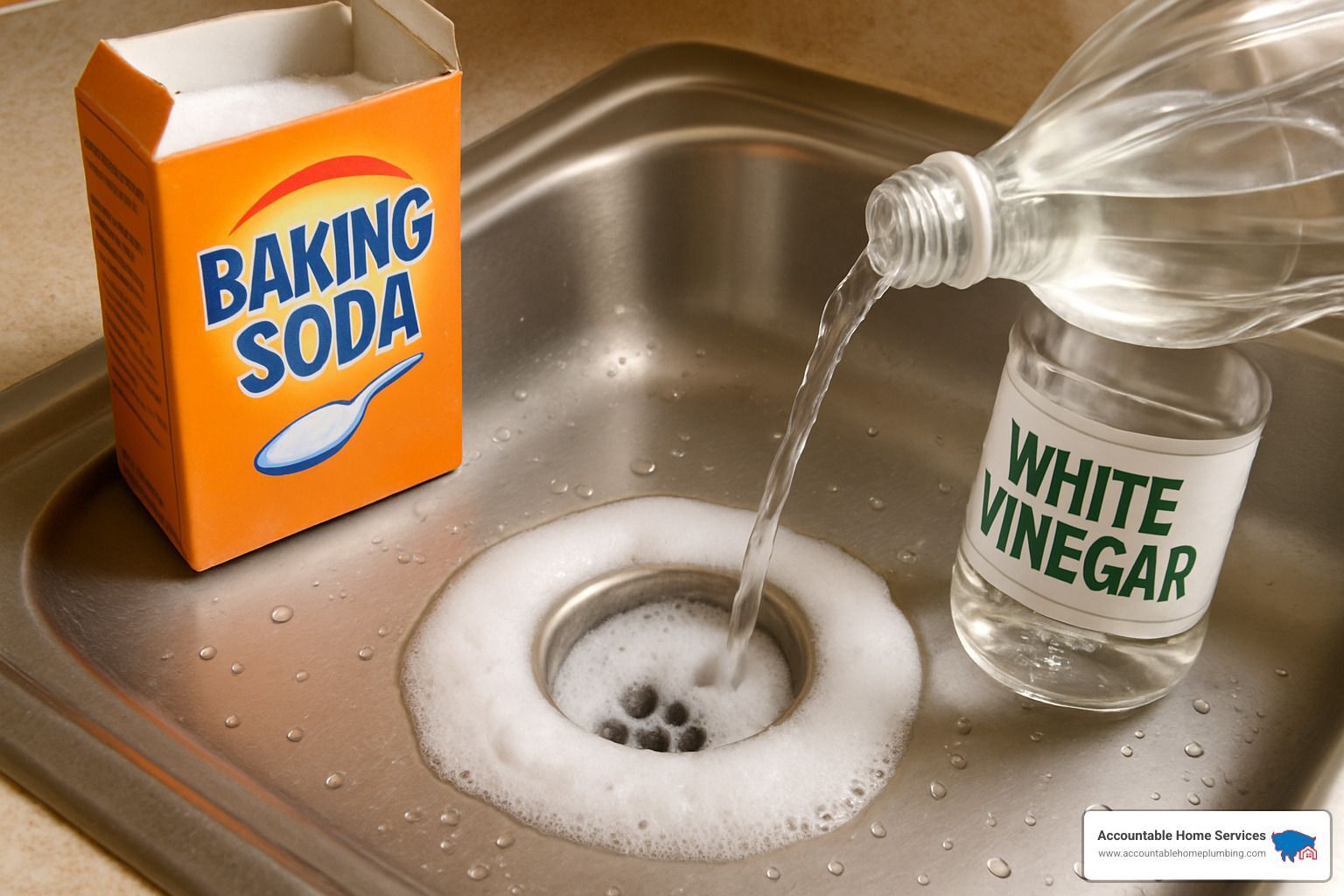
"We've replaced too many corroded pipes that were damaged by repeated use of chemical drain cleaners," shares one of our Denver technicians. "There are much safer and often more effective ways to clear clogs that won't harm your plumbing system."
Let's explore some gentler yet powerful alternatives that we recommend to our customers across the Denver Metro area. These plumbing tips will help you tackle clogs without resorting to harmful chemicals.
Plunger Technique
A good plunger is often your best first line of defense against clogs. It's simple, inexpensive, and surprisingly effective when used correctly. The key word here is "correctly" – many homeowners don't realize they might be plunging all wrong!
How to Use a Plunger Correctly
Cup vs. Flange Plungers
Not all plungers are created equal, and using the right type makes a world of difference:
Cup plungers are the classic red plungers with a flat rubber cup at the bottom. These work best on flat surfaces like kitchen sinks, bathroom sinks, and tubs. Their design creates suction against flat surfaces.
Flange plungers have an extended rubber flap (the flange) that folds out from the cup. These are specifically designed for toilets, as the flange fits perfectly into the toilet drain opening to create a tight seal.
I once visited a home in Lakewood where the family had been struggling with a toilet clog for days using a cup plunger. When I showed them how to use a proper flange plunger, the clog cleared in seconds – much to their amazement!
Creating a Proper Seal
The secret to effective plunging isn't brute force – it's creating the right seal. Here's how to do it:
First, make sure there's enough water in the fixture to cover the plunger cup. For sinks, you'll want to block the overflow hole with a wet cloth to prevent air from escaping. If you're working with a double sink, seal the second drain with a stopper or another wet cloth.
Position the plunger directly over the drain opening and press down firmly to form a tight seal before you begin plunging. This initial seal is crucial – without it, you're just pushing air around instead of creating the pressure needed to dislodge the clog.
Push-Pull Rhythm
The proper plunging technique is all about rhythm, not strength. Start with a gentle push to release any trapped air in the plunger. Then establish a consistent push-pull rhythm, maintaining the seal throughout the process.
After about 5-6 firm plunges, quickly pull up to break the seal. This sudden release of pressure often does the trick, sending the clogged material on its way down the drain.
"Many people just push down repeatedly and wonder why it's not working," explains our drain specialist. "But it's actually the combination of pushing and pulling that creates the pressure differential needed to dislodge clogs. Think of it as creating a mini pressure wave in your pipes."
Snaking 101: From Tub to Main Line
When your trusty plunger doesn't solve the problem, a plumbing snake (also called an auger) is your next best option before calling in the professionals.
Hand Auger
For most household clogs, a simple hand auger from your local hardware store will do the job:
Insert the end of the snake into the drain and turn the handle clockwise while gently pushing down. When you feel resistance, you've likely reached the clog. Continue turning to either break through the blockage or hook onto it so you can pull it out.
Once you feel the clog has been addressed, slowly pull the snake out, bringing the debris with it. Follow up with hot water to flush away any remaining residue. The satisfaction of pulling out a hair clog that's been slowing your shower drain for weeks is oddly rewarding!
Drum Snake
For more stubborn clogs or issues deeper in your plumbing system, a drum snake provides more power and reach. These can be rented from most hardware stores for a reasonable fee.
However, when it comes to main line clogs, we often recommend calling professionals like our team at Accountable Home Plumbing's Drain Cleaning service.
"Main line clogs can indicate more serious issues like tree root intrusion or pipe damage," our senior technician explains. "In Boulder and Arvada neighborhoods, where many homes have mature trees, we frequently find root systems that have compromised sewer lines. These require specialized equipment and expertise to address properly."
Safety Gloves
Always wear thick rubber gloves when snaking drains. This isn't just about keeping your hands clean – it's about protecting them from both sharp edges that might be lurking in your drain and potentially harmful bacteria. Trust me, as someone who's been elbow-deep in drains for years, good gloves are non-negotiable!
For those looking to expand their plumbing toolkit, consider investing in Shark Bite push-fit fittings for quick repairs. These innovative connectors have saved our customers countless headaches when dealing with small leaks that appear during the drain clearing process.
When it comes to your home's plumbing system, gentler approaches are almost always better in the long run. If you've tried these methods without success, that's when it's time to call in the professionals at Accountable Home Plumbing for our 24/7 Emergency Repairs service. Sometimes, what seems like a simple clog might be indicating a more complex issue that needs expert attention.
Leak Detection, Water Pressure & Shut-Off Know-How
Finding small leaks before they become big problems can be a real lifesaver for your home and wallet. Did you know water damage leads the pack for home insurance claims? It's true – about 40% of all claims stem from water-related issues that often could have been prevented with a little know-how.
Signs You Have a Hidden Leak
Your home often whispers before it screams when it comes to leaks. Here are the subtle signals to watch for:
Musty Odors
That persistent musty smell that won't go away even after cleaning? It's not just your imagination. Especially in bathrooms, basements, or around appliances, that distinctive mustiness often means hidden moisture is lurking somewhere it shouldn't be.
"Last month, a customer called complaining about a musty smell in their guest bathroom that hadn't been used in weeks," shares our leak detection specialist. "We found a slow leak behind the shower valve that had been dampening the wall for months."
Wall Stains
Your walls and ceilings can tell quite a story if you know how to read them. Those yellowish or brownish water stains don't appear by magic. Neither does bubbling paint or warped drywall. These visual clues are your home's way of saying "Hey, there's water where it doesn't belong!"
High Water Bill
Sometimes the first sign of trouble comes in your mailbox. An unexplained jump in your water bill when your usage habits haven't changed is nature's way of saying something's amiss. Even small drips waste surprising amounts – over eight gallons daily from a single leaky faucet.
"We had a customer in Northglenn whose water bill suddenly doubled," recalls our leak detection specialist. "We found a pinhole leak in a copper pipe behind their kitchen wall that had been slowly spraying water for weeks."
Keep Water Pressure in the Safe Zone
Think of your plumbing like your heart – the pressure needs to be just right. Too high, and you're straining the system; too low, and nothing works properly.
40-60 PSI: The Sweet Spot
Your home's pipes have their comfort zone – typically between 40 and 60 psi (pounds per square inch). When pressure climbs above 80 psi, you're essentially putting your entire plumbing system under stress. Connections weaken, appliances wear out faster, and pipes can eventually fail. Conversely, pressure below 30 psi means weak showers and appliances that can't function properly.
Pressure Regulator
If your home consistently feels the pressure (the wrong kind), a pressure regulator might be your best friend:
"Pressure regulators typically cost $300-500 installed, but they can prevent thousands in damage from burst pipes and worn-out appliances," notes our installation team. "Think of it as cheap insurance for your entire plumbing system."
For homes in mountainous areas around Denver, where elevation changes can create naturally high water pressure, these devices are especially important.
Test Procedure
Testing your water pressure isn't complicated – it's actually one of the simplest plumbing tips to follow:
- Pick up an inexpensive pressure gauge at any hardware store (they typically screw onto outdoor faucets)
- Make sure no water is running anywhere in your house
- Attach the gauge to an outdoor faucet and turn it on completely
- Read the dial – if it's dancing above 60 psi, it's time to consider a pressure regulator
Find & Label Your Main Shut-Off
When water is spraying everywhere, the last thing you want is to waste precious minutes searching for the shut-off valve. Everyone in your household should know exactly where to find it and how to use it.
Basement Valve
For most homes in the Denver Metro area, your main water shut-off hides in the basement or crawl space, typically where the main water line first enters your home. It's usually a gate valve (the kind you turn several times) or a ball valve (the kind with a lever that turns 90 degrees).
"We recommend taking a photo of your shut-off valve and sharing it with everyone in the house," suggests Mike from our emergency team. "It sounds simple, but in a panic, people often forget what they're looking for."
Curb Stop
There's actually a second line of defense – the curb stop. This valve sits near your property line, usually in an underground box. While it requires a special key to operate and is primarily used by water utilities, knowing its location can be helpful during major emergencies.
Quick Access
"We recommend labeling your main shut-off valve clearly and keeping any necessary tools nearby," advises our emergency response team. "In a burst pipe situation, every second counts."
A simple tag or bright paint mark on your shut-off valve can save crucial minutes during an emergency. Some of our customers in Lakewood and Aurora have even created small emergency kits with a flashlight, basic tools, and shut-off instructions stored near their main valve.
Knowing where this valve is located before you need it is one of the most important plumbing tips we can offer. It's like knowing where the fire extinguisher is – you hope you'll never need it, but you'll be incredibly grateful for the knowledge if you do.
Water Heater & Appliance TLC for Long Life
Your water heater and plumbing appliances aren't just conveniences—they're significant investments in your home's comfort and functionality. With a little tender loving care, you can dramatically extend their lifespan and avoid costly replacements.
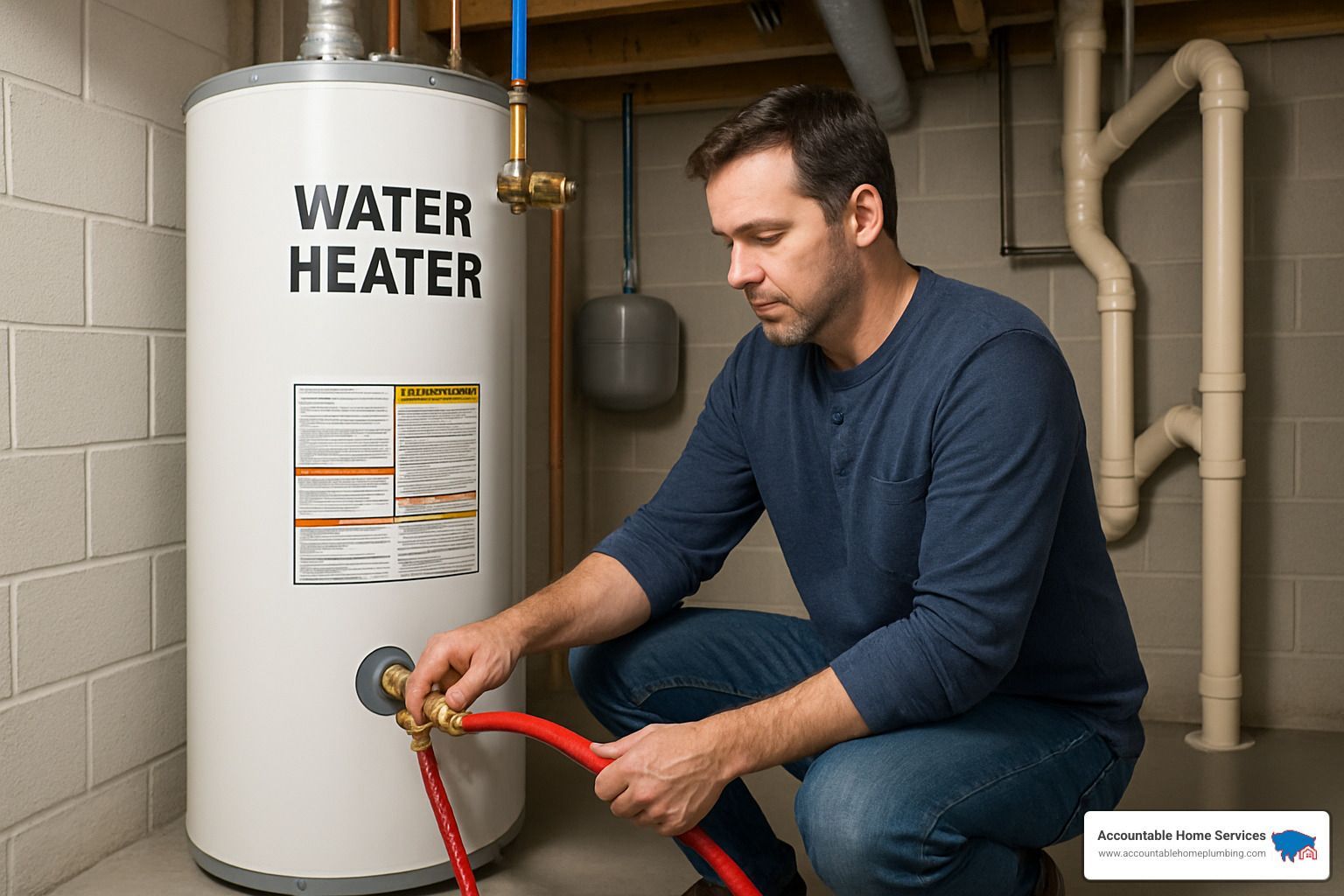
Extend Your Water Heater's Lifespan
Most water heaters quietly serve your home for 8-12 years before giving up the ghost. But here's a secret: with proper maintenance, you can squeeze extra years of reliable service from your unit.
Sediment Flush
If water heaters could talk, they'd beg you for an annual flush. Sediment buildup is like cholesterol in your arteries—it's the number one killer of water heaters across Denver homes.
"I can always tell when a water heater hasn't been flushed in years," says our technician Mark. "The sediment makes this distinct popping sound as the water heats—it's literally cooking minerals on the bottom of your tank."
Flushing your water heater once a year is surprisingly simple. Turn off the power (for electric) or set to pilot (for gas), shut off the cold water supply, connect a garden hose to the drain valve, and let it run until the water runs clear. Then just close the valve, disconnect the hose, and restore water and power.
For our customers in Longmont and Westminster where the water runs harder than a marathon runner, we recommend this plumbing tip twice yearly.
Temperature Check
Did you know your water heater temperature has a sweet spot? Setting your water heater to 120°F hits the trifecta: it prevents scalding accidents, saves energy, and reduces wear on your tank.
"For every 10 degrees you lower your water heater temperature, you'll see about 3-5% savings on your energy bill," explains our efficiency specialist. "Plus, you won't have to do that little dance in the shower when someone flushes the toilet."
Warranty Requirements
Here's something many homeowners find too late: most manufacturers require proof of regular maintenance to honor warranties. Keep a simple maintenance log noting when you've performed your annual flush and other checks. This small effort could save you hundreds if your unit needs warranty service.
Protect Plumbing Appliances
Your washing machine, dishwasher, and refrigerator ice maker all have water connections that deserve attention. These humble hoses and connections can cause outsized damage if they fail.
Braided Supply Lines
If your washing machine or dishwasher still has rubber supply hoses, you're living with a ticking time bomb. Insurance companies rank burst washing machine hoses among the top causes of home water damage.
"The difference between rubber and stainless steel braided hoses is night and day," notes our appliance specialist. "Stainless steel braided hoses cost about $15-25 each but can prevent thousands in water damage. We recommend replacing them every 5 years, even if they look perfect."
This simple plumbing tip takes just minutes to implement but offers years of protection. While you're at it, check the connections on your refrigerator water line too—these are often overlooked until they leak.
Lint Trap
Your washing machine sends tiny fibers down the drain with every load. Over time, this lint builds up in your pipes like a clogged artery. Installing a simple wire mesh lint trap on your washing machine's discharge hose can prevent this buildup.
Just purchase a lint trap that fits your drain hose, secure it with a clamp, and check it monthly. Your pipes will thank you, and you'll avoid the frustration of slow drains and backups.
Regular Inspection
Make a habit of taking a quick peek behind your appliances every few months. Look for any signs of moisture, discoloration, or puddles—these early warning signs can help you catch small issues before they become flood disasters.
"I had a customer in Arvada who noticed a small water stain behind their refrigerator," recalls our technician. "When we pulled it out, we found a pinhole leak in the water line that had been spraying for weeks. Because they caught it early, the repair was simple and the damage minimal."
For professional water heater service or to learn more about keeping your plumbing appliances in top shape, visit our Water Heater Repair & Installation page. We're always happy to help Denver homeowners get the most life out of their plumbing systems.
Seasonal & Emergency Readiness
Colorado's weather keeps us on our toes all year round. One day it's 70 degrees, and the next we're scraping ice off our windshields. This unpredictability makes seasonal plumbing preparation not just helpful, but essential for Denver Metro homeowners.
Winterize Before the Freeze
I'll never forget the winter of 2022. Our phones at Accountable Home Plumbing rang non-stop for a week straight after that sudden cold snap. Homeowners across Westminster and Arvada were dealing with burst pipes, flooding basements, and thousands in water damage.
Pipe Insulation
"An ounce of prevention is worth a gallon of mopping," as my grandfather used to say. Protecting your exposed pipes before freezing temperatures hit is surprisingly simple and affordable:
Foam pipe insulation sleeves cost just a few dollars at any hardware store and can be installed in minutes. Focus your efforts on pipes in unheated spaces like your garage, basement, or crawl space. Those pipes running along exterior walls are especially vulnerable – give them extra attention.
"For about $30 in pipe insulation materials, you can save yourself thousands in water damage repairs," I tell my customers in Boulder and Longmont, where temperatures regularly dip below freezing.
Hose Bib Drain
Your outdoor faucets are sitting ducks when winter arrives. Every fall, make this simple routine a priority:
Disconnect and drain all garden hoses before the first freeze. Then locate the shut-off valve inside your home that controls water flow to those outdoor faucets. Close it tight, and then open the outdoor faucet to drain any remaining water. For extra protection, add an insulated cover – they look like little styrofoam hats for your faucets and cost around $5 each.
"Most burst outdoor pipes I see could have been prevented with these simple steps," says our senior technician who's been serving Thornton homeowners for over a decade.
Crawlspace Heat
Crawlspaces are notorious cold spots where pipes often freeze. If your home has a crawlspace, consider adding a small space heater or heat lamp during extreme cold spells. Even raising the temperature a few degrees can prevent a plumbing disaster.
A Denver customer recently told me, "I put a $30 space heater in my crawlspace last winter after you suggested it. My neighbor skipped this step and ended up with $4,000 in repairs when his pipes burst."
What To Do When a Pipe Bursts
Despite our best efforts, pipes sometimes freeze and burst. Knowing exactly what to do in those critical first minutes can dramatically reduce damage to your home.
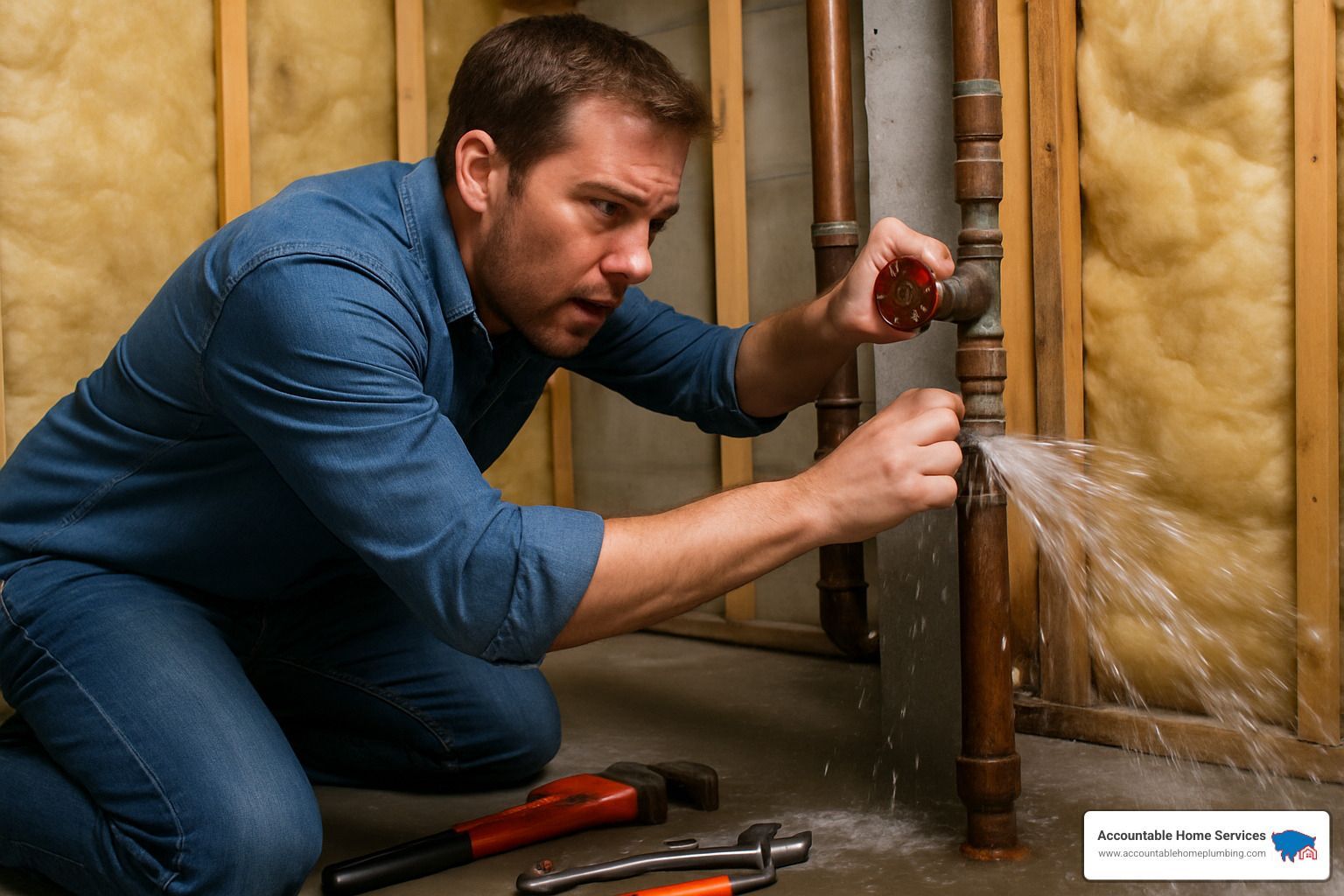
Shut Water
The moment you find a burst pipe, turn off your main water valve immediately. This is why knowing its location before an emergency is one of our most important plumbing tips. Every second counts – a burst pipe can release up to 100 gallons in just 8 minutes.
Open Faucets
After shutting off the main valve, open all your faucets throughout the house. This relieves pressure in the system and allows remaining water to drain out, reducing the amount of water that might leak from the broken pipe.
Call Pro
This is when having our number saved comes in handy. Contact Accountable Home Plumbing at our 24/7 emergency line. Our team provides rapid response throughout the Denver Metro area, including Broomfield, Westminster, Thornton, Northglenn, Arvada, Boulder, Denver, and Longmont.
Last winter, a family in Northglenn called us at 2 AM when a pipe burst in their upstairs bathroom. Because they knew exactly what to do – shut off water, open faucets, and call us immediately – we were able to minimize the damage and get them back to normal within days instead of weeks.
Document Damage
While waiting for us to arrive, take photos of everything. And I mean everything. Water stains, standing water, damaged belongings – document it all before cleanup begins.
"The photos you take in those first moments are gold when it comes to insurance claims," explains our customer service manager. "Insurance companies need proof of what happened, and your smartphone camera is your best tool for providing that evidence."
When a Longmont customer followed this advice after a pipe burst near their water heater, their insurance claim was processed without a single question – all because they had detailed photos showing exactly what happened before any repairs began.
When winter weather threatens or emergencies strike, Accountable Home Plumbing is just one call away with transparent pricing and no surprise fees. Because the last thing you need during a plumbing emergency is sticker shock on top of water damage.
Pipe Materials, Insurance & When to Call a Pro
Let me tell you about the pipes that keep your home running smoothly! After years of crawling through crawlspaces and peering into walls, I've seen how different pipe materials perform in Colorado homes.
Durability
When it comes to standing the test of time, copper still wears the crown. Those shiny pipes can last half a century or more when properly installed. That said, I've become a big fan of PEX in recent years.
"In newer homes throughout Denver, we're installing more PEX because of its freeze resistance and ease of installation," I tell homeowners during consultations. "It's particularly valuable in our Colorado climate where temperature swings can be dramatic."
Cost
Your wallet will definitely feel the difference between pipe materials:
Copper might be the Cadillac of pipes, but it comes with a luxury price tag for both materials and labor. I've seen homeowners experience sticker shock when replacing copper lines!
PEX offers a nice middle ground with moderate material costs and significantly lower labor costs since it's so flexible and requires fewer connections.
PVC and CPVC are the budget-friendly options, though the installation is still somewhat labor-intensive due to all those joints and connections.
Freeze Resistance
If you've lived through a Colorado winter, you know freezing pipes are a real concern. PEX is the champion here – it can expand slightly when water freezes without splitting. I've seen PEX pipes freeze solid and bounce back once thawed without a leak in sight!
Copper and CPVC, by contrast, are more vulnerable when temperatures plummet. Once these materials crack from freezing, there's no coming back – replacement is the only option.
Insurance & Professional Help
The fine print of your homeowners insurance policy matters more than you might think when it comes to plumbing disasters.
Sudden Damage Coverage
Here's a crucial plumbing tip many homeowners learn the hard way: insurance typically covers sudden accidents but not gradual problems or maintenance issues.
"Insurance typically covers the resulting damage from a plumbing failure but not the repair of the plumbing itself," I often explain to customers facing water damage. "That's why those routine maintenance plumbing tips we share are so important – they help prevent the problems insurance won't cover."
For example, if your water heater suddenly ruptures and floods your basement, insurance will likely cover the damaged flooring and belongings – but not the new water heater itself.
Labor Warranty
At Accountable Home Plumbing, we stand behind our work with clear warranties. I always encourage homeowners to ask direct questions about warranty coverage before hiring any plumber.
"What exactly is covered under your warranty?" is a question that can save you hundreds down the road. Some companies offer impressive-sounding "lifetime" warranties that actually contain so many exclusions they're practically worthless.
Vetting Plumber
Finding a trustworthy plumber is like finding a good doctor – you want someone skilled, honest, and reliable. Before you invite someone into your home to work on something as important as your plumbing system, verify:
Proper licensing and insurance – This protects both you and them. Don't be shy about asking for license numbers!
Years in business – Experience matters in plumbing. Those "school of hard knocks" lessons translate to fewer surprises in your project.
Online reviews – What are other homeowners saying? Look for patterns in feedback, not just one-off complaints.
Clear, upfront pricing policies – This is a big one we pride ourselves on at Accountable Home Plumbing.
"We believe in transparent pricing with no hidden fees," is more than just a slogan for our team. "Homeowners deserve to know exactly what they're paying for before work begins, not after the bill arrives."
When you're facing a significant plumbing project, a few extra minutes of research can save you from joining the ranks of homeowners with contractor horror stories. The right professional brings not just technical skills but peace of mind – and that's something worth investing in.
Frequently Asked Questions about Plumbing Maintenance
How often should I inspect my plumbing system?
You don't need to become obsessed with your pipes, but a little regular attention goes a long way. We suggest doing a walkthrough of your home's accessible plumbing once every season - it only takes about 15 minutes but can save you thousands.
"Most homeowners don't think about their plumbing until something goes wrong," says Mike from our inspection team. "But by then, what could have been a $50 fix might cost $500 or more."
During your seasonal check, keep an eye out for sneaky problems like water stains on ceilings or under sinks, corroded pipe connections, drains that seem slower than usual, or strange gurgling sounds. Don't forget to use your nose too - musty or sewage odors are usually red flags for hidden issues.
For older homes (20+ years), we recommend having a professional inspection annually. Newer homes can usually go every other year, though it's never a bad idea to have expert eyes check things out more frequently.
What items should never be poured down the drain or flushed?
Your drains and toilets aren't magical portals that make things disappear - whatever goes down must travel through your entire plumbing system.
"I'll never forget the $1,200 emergency call we had in Thornton last year," shares our drain cleaning specialist. "The homeowner had been pouring cooking grease down their kitchen sink for years. When we cut into the pipe, it looked like a clogged artery - completely lined with hardened grease."
Kitchen drains hate cooking oils and grease, coffee grounds, eggshells, flour, rice, and pasta (these expand with water), paint products, and harsh chemicals. Instead of pouring grease down the drain, let it cool and toss it in the trash.
Toilets are especially vulnerable to items marketed as "flushable" that actually aren't. Despite what the packaging claims, flushable wipes don't break down like toilet paper. Other bathroom bandits include feminine hygiene products, dental floss (which can wrap around pipes like string), cotton products, paper towels, tissues, cat litter, and cigarette butts.
The rule of thumb? If it's not toilet paper or something you've personally digested first, it doesn't belong in your toilet.
When is it smarter to call a professional plumber instead of DIY?
I'm all for saving money with DIY projects, but sometimes calling a pro first actually costs less in the long run. Here's when you should put down the wrench and pick up the phone:
Water heater troubles should always warrant a call to us. Gas models have obvious dangers, but even electric water heaters can cause serious damage or injury if handled incorrectly.
Main line clogs generally require specialized equipment that most homeowners don't have in their garage. When multiple drains are backing up simultaneously, that's your signal to call for professional help.
Persistent leaks that don't resolve with simple fixes might indicate larger issues within your walls or under your foundation. Our leak detection equipment can find problems without unnecessary demolition.
Home-wide low water pressure often signals serious supply line issues that DIYers typically can't diagnose properly.
Any gas line work should always, without exception, be handled by licensed professionals. The risks simply aren't worth it.
Sewer line problems require specialized cameras and equipment to properly diagnose and fix. The sludge factor alone makes this a job best left to the pros!
Major renovations requiring permits should involve licensed plumbers. Non-permitted work can come back to haunt you when selling your home.
"We get calls weekly from frustrated homeowners who tried to save money with DIY repairs only to end up with water damage, broken fixtures, or even worse problems," our master plumber explains. "What would have been a straightforward $200-300 service call often turns into $2,000+ emergency repairs after a DIY attempt goes wrong."
At Accountable Home Plumbing, we provide upfront pricing with no surprises, so you'll know exactly what you're paying before we start any work. Sometimes the smartest DIY decision is knowing when to call a professional.
Conclusion
After years of responding to plumbing emergencies that could have been prevented, I've seen how these plumbing tips can transform a home's maintenance routine. At Accountable Home Plumbing, we don't just fix problems—we empower homeowners to protect their investments and avoid those middle-of-the-night disasters that always seem to happen at the worst possible time.
Think of these maintenance strategies as an insurance policy for your home's veins and arteries. Just as you wouldn't skip oil changes for your car, your plumbing system deserves regular attention too.
The most valuable lesson I've learned in my plumbing career is that prevention is always cheaper than repair. Those five minutes you spend cleaning a drain strainer today might save you $500 in emergency service calls next month. That little bit of effort to properly dispose of cooking grease could prevent a major kitchen drain backup during your holiday dinner.
Getting to know your home's plumbing intimately pays dividends. I've seen the relief on homeowners' faces when they confidently shut off their main water valve during an emergency, stopping a potential flood in its tracks. Understanding what materials your pipes are made from helps you make better decisions about repairs and modifications down the road.
Here in Colorado, seasonal maintenance matters tremendously. Our temperature swings can be brutal on plumbing systems. A few minutes spent insulating pipes before that first deep freeze can prevent the heartbreak of coming home to water pouring through your ceiling.
Don't underestimate how much water conservation saves money. A silent toilet leak can waste 200 gallons daily—that's not just environmentally wasteful, it's a direct hit to your wallet every month. The simple food coloring test I mentioned earlier can catch these invisible thieves before they drain your budget.
Finally, know when to call a professional. We appreciate DIY spirit, but some jobs require specialized tools and knowledge that come from years of training. What looks like a simple fix on YouTube can quickly turn complicated when you're dealing with your home's specific plumbing configuration.
With our 24/7 emergency service throughout the Denver Metro area, including Broomfield, Westminster, Thornton, Northglenn, Arvada, Boulder, Denver, and Longmont, we're always ready when you need us. Our transparent pricing policy means what we quote is what you pay—no surprise fees or hidden charges when the bill arrives.
For maintenance questions, emergency repairs, or just some friendly advice about your plumbing system, Accountable Home Plumbing is just one call away. After all, accountability isn't just in our name—it's the foundation of everything we do, from the smallest drain cleaning to complete repiping projects.

